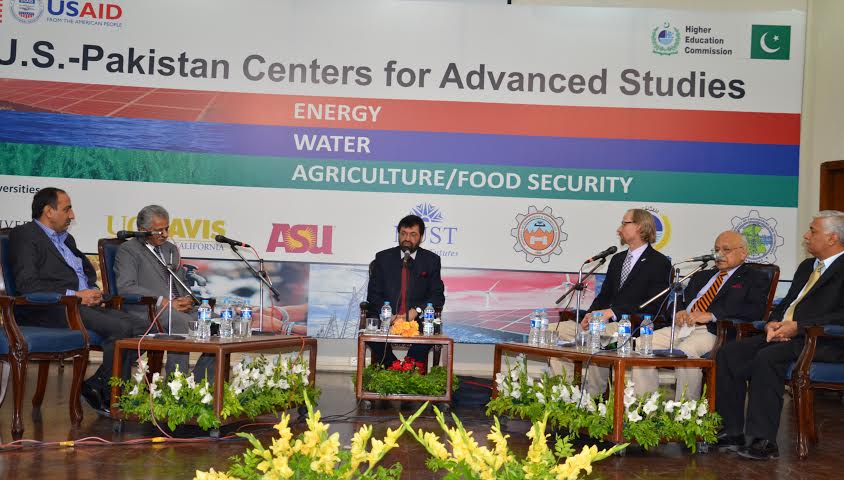ISLAMABAD ( BMZ REPORT )
Prof. Dr. Mukhtar Ahmed, Chairman, Higher Education Commission (HEC) of Pakistan has said that the Centres for Advanced Study (CAS) programme builds on a legacy of collaboration between Pakistan and the US involving over 50 years of cooperation, progress, and shared vision for advancement of education, science, technology, agriculture, and commerce.
He was speaking at the opening ceremony of Panel Discussion on Role of three newly established Centres of Advanced Study in Energy, Food Security & Agriculture and Water held at HEC Secretariat on Thursday. These centres have been established respectively at National University of Sciences and Technology, UET Peshawar, University of Agriculture, Faisalabad (UAF) and Mehran University, Jamshoro.
Each centre will establish a partnership with at least one university in the U.S. with expertise in the technical focus of the centre, and working relationships with the business community and government agencies that relate to the technical focus of each center. Each centre will develop using a different model, based on the capacity of the university and the needs of the sectors. The CAS is seen as a long-term effort with potential for subsequent phases.
Mr. Greg Gottlieb, Mission Director USAID, Vice Chancellors, Members of National and Provincial Assemblies, academicians, researchers, senior Government officials and other stakeholders attended the discussion.
The Chairman HEC said that HEC has played a significant role for achieving excellence in Science and Technology and transforming human development to the knowledge based economy. He mentioned that the modern university, with its mix of quality teaching, innovation and research, is different from universities of the past which only served as teaching grounds. He said that Pakistan is also catching up to these global trends despite its limited financial resources.
He congratulated the host universities for establishment of these centres after brainstorming sessions spreading over 4-5 years, adding that the real work has begun now. “Its your responsibility to come up with tangible short-term and long-term solutions to the challenges that the country is facing in these critical areas.”
Mr. Gottlieb said that these Centres will provide important bridges across the academia-industry and academia-government divides, and will deliver courses, conduct research, and perform other services valued by industry, the private sector, civil society, and government.
He expected that the Centres will be innovative and provide cutting-edge research, enhance teaching and learning, entrepreneurship activities, and strengthen policy formulation for the Government of Pakistan.
Participants of three separate panel discussions on each area agreed that these centres for applied studies will raise selected graduate training programmes to an international level, establish leading-edge expertise in relevant disciplines closely linked to Pakistan’s national economic development strategy.
These centres will work on research and policy and actively engage in policy dialogue and setting research agendas that improve the lives of Pakistanis and promotes economic growth, besides creation of a cadre of effective managers for private and public sector in the agriculture, water and energy sectors.

